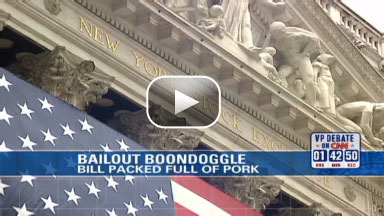The senate passed a revised version of the Wall Street bailout bill on Wednesday. Of course, the bill already passed the Senate once before, and then failed in the House of Representatives. So the shameless, corrupt hacks who pass themselves off as “leaders” in Washington came up with an ingenious plan to make this travesty of a bill more appealing to the colleagues in the House: Pack it with even more earmarks, pork and wasteful pet projects.
Originally the bailout was supposed to be worth $700 billion, though everyone admitted that it could really cost taxpayers more than $1 trillion. With all the added pork, we don’t even know how much taxpayers are on the hook for now. But we do know what passes for leadership in Washington: Taking a bad bill and making it worse.
The largest business lobby in this country is at it again, pushing policies that favor corporate America over middle-class Americans. The U.S. Chamber of Commerce is fervently lobbying for the $700 billion bailout of its greedy member companies. Of course the largest, greediest mega-businesses in this country want a $700 billion reward for their reckless practices that preyed on ordinary Americans. But that’s not enough for the Chamber of Commerce. It’s sending its droves of lobbyists to Congress to cram even more selfish, pro-greed provisions into the bill. Click here for that story.
Last month, the House overwhelmingly passed the Credit Cardholders’ Bill of Rights despite intense lobbying from the banking industry not to give rights to struggling consumers. The bill would prevent banks from abusing customers by arbitrarily changing fees, interest rates and payment rules at any time with no notice. But the corrupt “leaders” in the Senate have not taken up the legislation and say they have no plans to do so, even as the government is rushing to dole out $1 trillion to the mega-banks and greedy corporations that created the current financial crisis. Click here for our report on the disgraceful abuse of ordinary Americans at the hands of the ultra-rich in Congress and the financial industry.




 发表于 2008-10-5 09:35:00
发表于 2008-10-5 09:35:00
